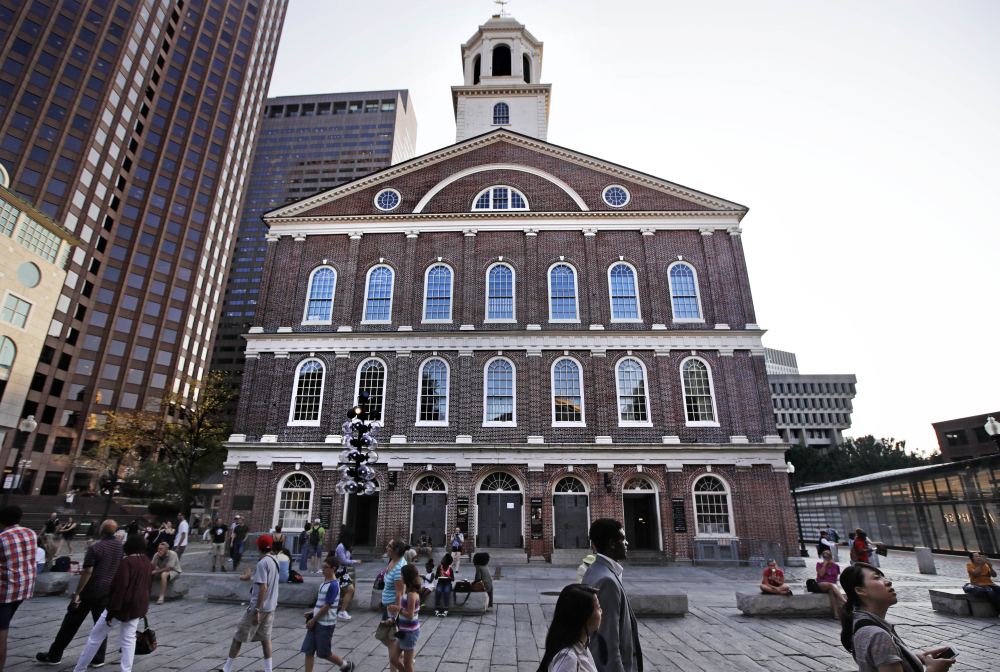BOSTON — As cities grapple with what to do with Confederate statues, an advocacy group is calling for renaming Boston’s historic Faneuil Hall because its namesake had ties to the slave trade.
The brick meeting house, built in 1742 and nicknamed the “Cradle of Liberty,” was where Samuel Adams and other American colonists made some of the earliest speeches urging independence from Britain.
Decades later, Frederick Douglass and other prominent abolitionists of the 1800s would use its famous stage to call for an end to slavery.
But Kevin Peterson, founder of the New Democracy Coalition, says it’s past time to change the hall’s name because it was built and donated to Boston by Peter Faneuil, a wealthy merchant who owned and traded slaves.
“It’s an embarrassment to this city to remain focusing on this place as a place of celebration and as a place of which we should have some civic pride with this name attached to it,” said Peterson, whose nonpartisan group is focused on “renewing civic life.”
He made the comments last week in front of Faneuil Hall. City leaders, including Mayor Marty Walsh, had gathered at the landmark to call for peace in the aftermath of the violent white nationalist protest in Charlottesville, Virginia, that left one counterprotester dead and dozens of others injured Aug. 12.
Peterson suggests renaming the hall in honor of Crispus Attucks, a man of black and Native American heritage who was considered the first martyr of the American Revolution when he was killed not far from the hall in the Boston Massacre of 1770. Peterson said he wrote a letter to the mayor in May and hasn’t heard back.
Walsh has said it’s not the right time to debate the name change, given the emotion following the Charlottesville disturbance and heated arguments over removing Confederate monuments across the country.
The Democratic mayor noted that many prominent black leaders have spoken at the hall, including Martin Luther King, Jr., and that it’s a regular site for U.S. citizenship ceremonies.
Historians also suggested caution in moving to rename the hall. Robert Allison, a Suffolk University history professor, said it would be a “misguided and ineffectual” way to set history straight. “Erasing history by changing names is not a way to engage it, or understand it, but simply a way to forget it,” he said.
If the hall’s name isn’t changed, it’s important that its ties to slavery be given “wider and deeper recognition,” said Barbara Lewis, director of the William Monroe Trotter Institute for the Study of Black Culture at the University of Massachusetts-Boston. She suggested providing that through a permanent exhibit in the building.
Heather Cox Richardson, a Boston College history professor, said she supports removing all “celebratory” Confederate monuments from public properties but opposes simply renaming or removing all memorials to “problematic forebears.” “This country was founded on racial, gender and class biases. That is inescapable,” she said. “Our complex history needs to be contextualized, recognizing both the weaknesses and the strengths of our ancestors.”
Massachusetts leaders have appeared more open to the idea of changing or removing other controversial memorials in recent weeks.
In June, the state boarded up its lone memorial to the Confederacy: a stone marker on a historic island fort in Boston Harbor.
The monument, placed by the United Daughters of the Confederacy in the 1960s, honors 13 Confederate soldiers who died as prisoners of war on the island.
Copy the Story LinkSend questions/comments to the editors.



Success. Please wait for the page to reload. If the page does not reload within 5 seconds, please refresh the page.
Enter your email and password to access comments.
Hi, to comment on stories you must . This profile is in addition to your subscription and website login.
Already have a commenting profile? .
Invalid username/password.
Please check your email to confirm and complete your registration.
Only subscribers are eligible to post comments. Please subscribe or login first for digital access. Here’s why.
Use the form below to reset your password. When you've submitted your account email, we will send an email with a reset code.